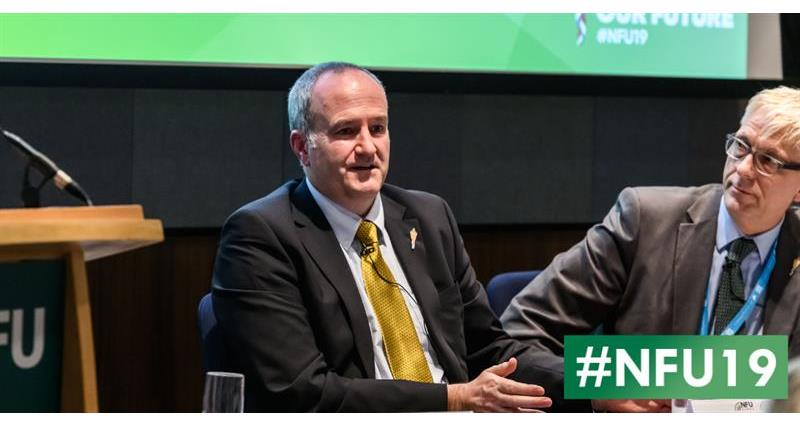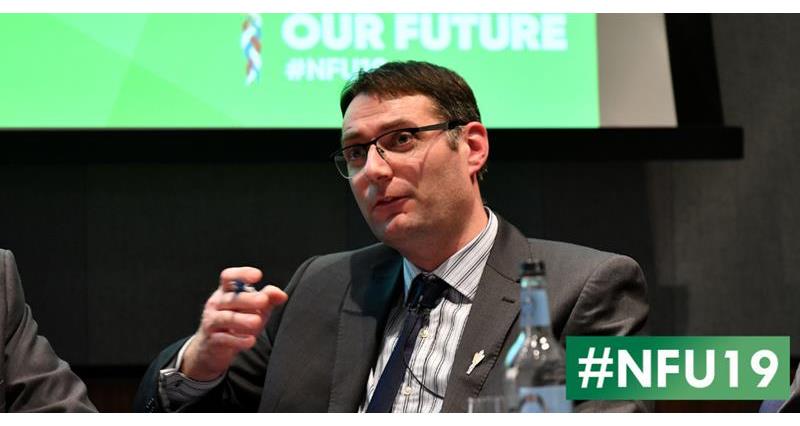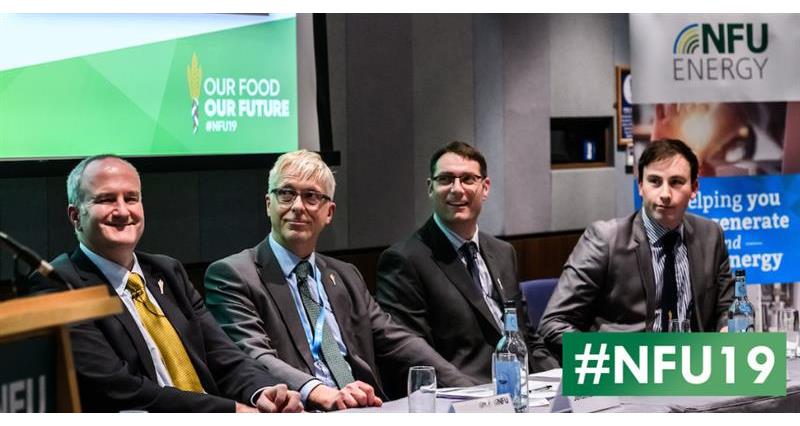The latest figures indicate that 35-40% of NFU members are already investing in some form of renewable energy generation to reduce on-farm energy costs and benefit from a diversified income stream.
What has driven this investment and what does the future hold for financial incentives, government regulation, energy prices and new product innovation?
Here is what the experts said during their session at NFU Conference 2019.

Pictured above: Tim Pratt, NFU Energy technical director (left) and Jonathan Scurlock, the NFU's chief adviser for renewable energy and climate change
Tim Pratt, technical director, NFU Energy:
“The importance of the price of electricity and gas to farmers and growers businesses is at an all-time high. Ten years ago, this was only of particular concern to larger, energy intensive businesses and the focus was the cost of bought in energy.
“However, with the significant investment in renewable energy since then, the value of the energy produced and sold is now equally important. So ‘low is good’ for some and ‘high is good’ for others. What will the future hold? A review of past and current market prices might just provide some insight.
“I don’t have a crystal ball unfortunately. We are all worried about risk and volatility, and whether or not you should have a strategy depends on you and your business.”
Dr Jonathan Scurlock, NFU chief adviser for renewable energy and climate change:
“Energy security, food security and climate change are still converging as significant drivers of future agricultural policy. As scientists call for limiting global warming to just 1.5C, the NFU has set a new ambition of 'net zero agriculture' by 2040, facing down the challenge from our international competitors in the low-carbon farming stakes.
“We’re behind the curve compared with some of major European competitors on converting to green energy but renewable energy remains one of the most popular sources of diversification to boost farm income as we transition to a new UK agricultural policy.
“In place of renewable energy incentive payments, we have market-led deployment, but other forms of government support remain important; with new opportunities in decarbonising national heat supply, electric agricultural vehicles and the use of battery storage.
“Following his speech this morning, we’re looking to the Defra Secretary of State Michael Gove to support us when diversifying our farm businesses in the future.”
Oliver Coe, head of technical delivery, NFU Energy:
“The regulatory landscape with regards to energy in the UK has changed significantly even in the last few years. Of late, government support for new means of energy production has been waning and more policy designed to reduce the wider environmental impact of industries has been introduced. “This change of emphasis from ‘carrot’ to ‘stick’ has far reaching implications for new and existing agricultural and horticultural practices used for heat and electricity production. However, with greater regulation also comes the motivation to implement best practices, as well as to identify opportunities for reducing underlying energy costs for farmers and growers.
“Record keeping is vital to be able to tell if your plant is working efficiently day-to-day, and make sure you read all the guidance thoroughly.”

Pictured above: Jon Swain, head of sales, NFU Energy
Jon Swain, head of sales, NFU Energy:
“The last ten years have seen agricultural businesses invest in renewable energy at unprecedented levels backed by support from governmental schemes such as Renewables Obligation Certification (ROC), Feed-in Tariff (FiT) and Renewable Heat Incentive (RHI). With the end of these support mechanisms, the time is now to consider how maximum returns can be made from your investments through best placement of the energy produced and by maximising self-consumption and improving efficiencies on farm.
“With concerns about the sustainability of agriculture, the need to reduce carbon emissions and improve the use of resources at an all-time high, NFU members need to look at how they can meet this challenge in consideration of the energy used.
“Rather than do without, do more with less. Use what you’ve got and use it efficiently.”
Q&A: The panel answer audience questions:
What is NFU Energy?
NFU Energy (previously FEC Energy) is one of the UK's leading energy consultancies. It provides advice and practical support to businesses, with a special focus on agriculture and horticulture.
NFU Energy’s team of engineers and account managers can provide practical guidance and assistance covering anything from energy audits, feasibility studies to accreditations plus enjoy an initial free consultation and 10% discount on any new instructions.
Following its rebrand, NFU Energy will continue to negotiate the best electricity prices possible for NFU members and members who have joined the NFU Buying Group are currently receiving savings of up to £250 per annum.
To find out how NFU Energy could save you money, call 024 7669 6512 or email aW5mb0BuZnVlbmVyZ3kuY28udWs=.
